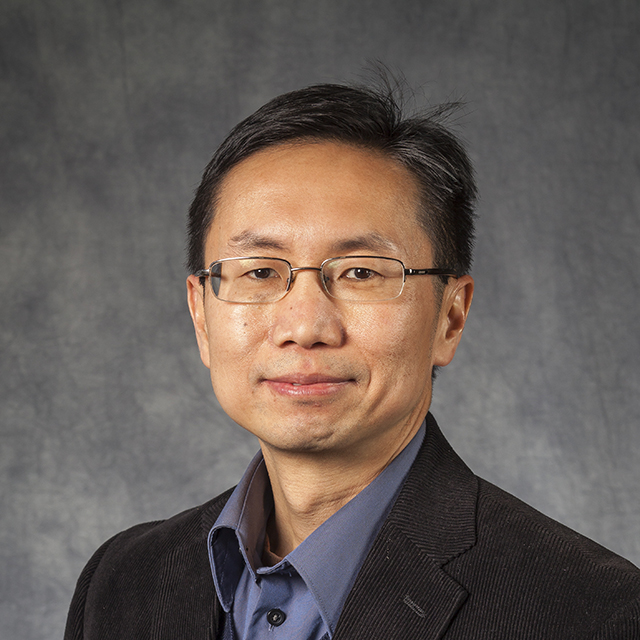Contact Information
Biography
Dr. Meng holds a B.S. in pharmacy from the University of Maryland and practiced pharmacy
in Baltimore and Los Angeles. He earned a Ph.D. in pharmaceutical sciences from the
University of Southern California, where he deciphered solvent-mediated interactions
in peptide-MHC complexes with Ian Haworth and Hermann von Grafenstein. He then completed
a postdoctoral fellowship at UCLA School of Medicine in the laboratory of James Economou,
where he discovered novel human CD8 T cell epitopes derived from alpha fetoprotein,
a tumor-associated antigen, and advanced a prime-boost DNA immunization strategy in
mouse models of cancer.
Dr. Meng is Professor of Pharmaceutics in the School of Pharmacy and an affiliate
faculty of the McGowan Institute for Regenerative Medicine of the University of Pittsburgh.
He has served as grant reviewer for the National Institutes of Health (P01, U19/U01,
and regular study sections) and the Department of Defense (CDMRP). Dr. Meng was awarded
the President’s Award for Excellence in Scholarship and the University Creative Teaching
Award. A holder of the William Patrick Power, C.S.Sp., Endowed Chair in Academic Leadership,
he has served as Division Head since 2020.
Education
Visiting Scientist, Carnegie Mellon University
Postdoctoral Fellowship, UCLA School of Medicine
Ph.D., Pharmaceutical Sciences, University of Southern California
B.S., Pharmacy, University of Maryland
Profile Information
School
Dr. Meng is an expert in developing drug delivery strategies for modulating immunological functions in disease states that include cancer, transplantation, and autoimmunity. The Meng group applies biomaterials science and computational modeling to advance the understanding of controlled delivery of monoclonal antibodies and fusion proteins and delineating immune mechanisms in vivo and in organoids. The group pursues studies that bridge gaps between preclinical and clinical stages in drug development, focusing on enhancing drug bioavailability in target tissues while reducing systemic toxicities. The goal is to integrate formulation designs, pharmacokinetics and pharmacodynamics, and immunogenicity into the development of pharmaceutical proteins.
NIH R21 AI171241 (MPI: Empey, Meng); 2/2/2023-1/31/2025
Project title: Optimization of a Self-adjuvanted Nanoparticle Platform for Delivering Respiratory
Syncytial Virus Antigen DS-Cav1
COVID-19 Emergency Competitive Revision for NIH R21 AI139828 (PI: Meng); 7/2/2020-1/31/2021
Project title: Development of a Regulatory T Cell Mimetic for Tolerance Induction
in Skin
TransplantationNIH R21 AI139828 (PI: Meng); 2/6/2019-1/31/2021
Project title: Development of a Regulatory T Cell Mimetic for Tolerance Induction
in Skin Transplantation
Department of Defense KCRP Concept Award 2018 (PI: Meng): 09/01/2018-08/31/2019;
Project title: "Generating Systemic Antitumor Immunity in Renal Cell Carcinoma by
Intratumoral Injection of Multiplexed Anti-PD-1 Antibody and Adenosine Deaminase"
Juvenile Diabetes Research Foundation 2-SRA-2016-318-S-B (Co-I: Meng; PI: Nick Giannoukakis of ASRI); 09/01/2016-08/30/2018;
Project title: "Tolerogenic Nanoparticle Therapy for Type 1 Diabetes"
NIH R43 AI124783 (Co-I: Meng; PI: Alan Lewis of Diavacs, Inc. San Diego, CA); 07/01/2016-06/30/2017;
Project title: "Antisense-Loaded Microsphere Therapy for Autoimmune Diseases."
NIH R21 AI113000 (PI: Meng); 8/1/2014-7/31/2017
Project title: A Biomaterial Approach to Attenuate Rejection of Skin Allografts
NIH R01 AI123392 (Co-I: Meng; PI: Fan of Allegheny-Singer Research Institute); 01/15/2016-12/31/2019
Project title: Induction of allogeneic tolerance with bioengineered thymus organoids"
JDRF 17-2012-348 (Co-PI: Meng; PI: Giannoukakis of Children's Hospital of Pittsburgh); 9/1/2012-8/30/2014
Project title: Type 1 Diabetes-Suppressive Microspheres
NIH R15 AI081218 (PI: Meng); 12/1/2010-11/30/2014
Project title: Genetic Modification of Antigen-Presenting Cells in Allograft
CURE-Pennsylvania Department of Health (PI: Meng); 1/1/2012-12/31/2013
Project Title: A Biomaterial Approach to Inhibit Melanoma Growth and Metastasis in
Mice
CURE-Pennsylvania Department of Health (PI: Meng); 1/1/2007-12/31/2010
Project Title: Modulation of Antitumor Immunity with Anti-Foxp3 siRNA Nanoparticles
NIH R15 CA97990 (PI: Meng); 03/10/2004-02/28/2008
Project title: Rational Design of Peptide-Based Tumor Vaccines
Visit Dr. Meng's Publications at Google Scholar.
- Basic and Applied Immunology
- Hematology, Oncology, and Transplantation
- Biopharmaceutics
- Pharmaceutical Biotechnology


